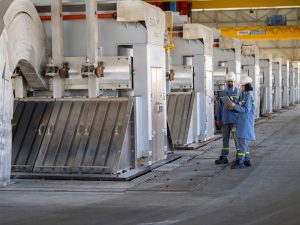ABU DHABI / WAM
Emirates Global Aluminium (EGA) on Thursday announced start of hot metal production at pilot reduction cells for EX, the company’s next generation aluminium smelting technology.
The pilot at Al Taweelah is a key step in readying the technology for large-scale industrialisation, making the project a key foundation for both future low-carbon primary aluminium production growth at EGA and the strengthening of EGA’s position as the smelting technology provider of choice for the global aluminium industry.
The pilot will also be used to prove the most advanced Industry 4.0 capabilities in the aluminium industry. All EGA’s existing Industry 4.0 use case will be deployed in the new technology and the company is developing new state-of-the-art digital capabilities centred on artificial intelligence and advanced data analytics.
Abdulnasser Bin Kalban, Chief Executive Officer of Emirates Global Aluminium, said, “First hot metal from these EX Technology reduction cells is a key milestone for both our technology leadership and future growth at EGA.
Our goal is to expand our primary aluminium production with the most advanced and smart aluminium smelting technology, to build the smelter of the future and to create further value for EGA through smelting technology partnerships around the world.”
EGA has developed its own aluminium smelting technology in the UAE for more than 35 years. EGA has used its own technology in every smelter expansion since the 1990s and has retrofitted all its older production lines.
EGA was the first UAE industrial company to license its core process technology internationally, in a deal with Aluminium Bahrain in 2016 for use in the Bahraini company’s Potline 6 expansion project.
EX is EGA’s 10th generation smelting technology. Construction of the pilot pots began in late 2024.
EGA’s EX has been designed to produce more aluminium with less energy per tonne and lower emissions. EX reduction cells provide higher productivity per square meter compared to our latest DX+ Ultra technology.
The next generation technology is expected to reduce greenhouse gas emissions per tonne of aluminium produced by around five per cent for the more productive variant and around 12 percent for the lower energy variant.
 The Gulf Time Newspaper One of the finest business newspapers in the UAE brought to you by our professional writers and editors.
The Gulf Time Newspaper One of the finest business newspapers in the UAE brought to you by our professional writers and editors.
